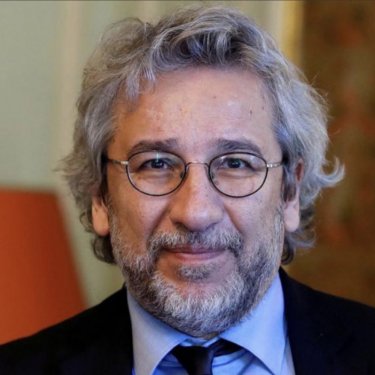Turkey disgraces itself by placing leading journalist on terrorism wanted list

Reporters Without Borders (RSF) calls on Turkey to stop persecuting Can Dündar, a Turkish investigative journalist living in self-exile in Germany, who has just been added to the Turkish interior ministry’s “grey list” of persons wanted for supposedly cooperating with a movement led by US-based Turkish Muslim cleric Fethullah Gülen, which Turkey classifies as a “terrorist” organisation.
Claiming that Gülen was behind an abortive coup attempt in Turkey in July 2016, the Turkish government has been seeking his extradition from the United States. At the same time, it has created a list of persons wanted for their connection to Gülen’s movement, which the government refers to as the “Fethullah Terrorist Organisation / Parallel State Structure” or by the Turkish acronym “FETO/PDY.”
The interior ministry has now added Dündar to this wanted list by posting his name on its website along with his date and place of birth and the word “Feto” – acronym for “Fethullah Terrorist Organisation.” This is a deliberate act of intimidation, as the interior ministry offers a reward of 500,000 Turkish lira (25,000 euros) to anyone helping to capture someone on the list.
“The relentless administrative and judicial persecution of Can Dündar is clearly designed to intimidate him as he continues his journalistic activities in Berlin. By adding him to a list of the most wanted persons, the Turkish authorities have crossed another threshold in their harassment of journalists based outside the country.
Dündar’s problems began in 2015 when, as the Istanbul-based editor of the daily newspaper Cumhuriyet, he published a story headlined “İşte Erdoğan’ın yok dediği silahlar” (These are the weapons whose existence Erdogan denies). It was accompanied by photos and videos that showed that Turkish intelligence was helping to supply weapons to Islamist groups in Syria.
It was as a result of this story that Dündar received the RSF-TV5 Monde Press Freedom Prize later the same year. But it also elicited an angry reaction from President Recep Tayyip Erdogan, who threatened him on the air on the state TV channel TRT, saying: “The person who wrote that exclusive article will pay dearly. I won’t let him get away with it.”
Politically-motivated judicial harassment
And so it was. The judicial cases against Dündar have been accumulating for the past six years. In November 2015, he was arrested and held for three months, until released on the basis of a ruling by the Constitutional Court, which said his detention was unconstitutional. After a court appearance in the Istanbul district of Caglayan on 6 May 2016, Dündar narrowly escaped an armed attack as he left the court building to give interviews to the journalists outside. It was this attack that led him to move to Germany, where he launched a news website called Özgürüz (We are free).
On 23 December 2020, an Istanbul court sentenced him in absentia to 27 years in prison for “spying” and “assisting a terrorist organisation.” Turkey’s request for his extradition was immediately rejected by the German government, which said: “On principle, Germany never extradites persons convicted in political cases.”
Along with several civil society figures including the philanthropist Osman Kavala, Dündar is also facing the possibility of a life sentence for encouraging major anti-government protests in Istanbul’s Gezi Park in the spring of 2013. “Pending his arrest,” his case was separated from those of the other defendants on 25 April 2021.
Finally, Dündar is also still facing several dozen years in prison for posting a video about the arms shipments to Islamist groups in Turkey on Özgürüz on 1 March 2017. His trial before an Istanbul court will resume on 5 April.
Turkey is ranked 149th out of 180 countries in RSF's 2022 World Press Freedom Index.
